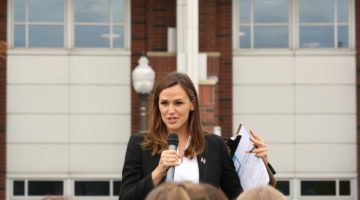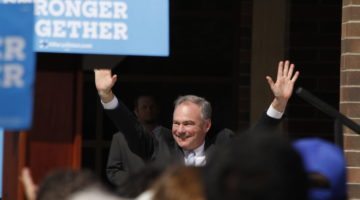
Breanna Denney/Nevada Sagebrush
Vermont Sen. Bernie Sanders pauses during a Reno campaign rally in front of the Mathewson-IGT Knowledge Center last August. Sanders has been one of the most vocal opponents to the Obama administration’s trade policy this election cycle.
By Jacob Solis
Editor’s note: On the Issues is a new series from The Nevada Sagebrush that will tackle issues from the 2016 presidential campaign with the help of University of Nevada, Reno, professors.
The issue of international trade, and specifically the issue of trade agreements, has proven especially salient during the past few months of this year’s presidential election. It was just last month that Vermont Sen. Bernie Sanders vehemently denounced what he called “disastrous” trade agreements during a debate in Flint, Michigan.
“Corporate America said, ‘Why do I want to pay someone in Michigan a living wage when I can pay slave wages in Mexico or China,’” Sanders said. “Those trade policies, policies, has resulted in the shrinking of the American middle class … how stupid is that trade policy?”
It’s a hard-line stance that both Sanders and Republican frontrunner Donald Trump have stuck to steadfastly, and it’s put candidates who’ve stood by U.S. trade policy in the past, notably Hillary Clinton and Ohio Gov. John Kasich, in a sticky situation.
So what makes free trade an issue? As it turns out, the matter is more complicated than meets the eye, at least according to Elliott Parker, an economics professor at the University of Nevada, Reno, who teaches international trade.
But, first things first.
What is free trade?
“Free trade means government does not prevent people in different countries from trading with each other, just like we don’t allow government to prevent Nevadans and Californians from trading with each other or you and I from trading with each other,” Parker said. “When we say ‘free,’ what we mean is that people in different countries can do business with each other, and it’s that simple.”
Parker added that most free trade is not truly free, as governments will still employ some kind of regulation, be it tariffs, quotas, subsidies or otherwise. What governs all this trade is a series of trade agreements, the biggest of which being the General Agreement on Tariffs and Trade. Signed off by the Truman Administration after World War II, GATT has since morphed into the World Trade Organization.
The WTO, Parker says, is mostly just a treaty. It governs the way the trade happens because it sets down certain rules, namely that countries reduce average tariff rates. However, international trade is more than just GATT and the WTO. Individual agreements between specific countries have created a vast network of agreements that governs the economic interactions of the entire globe. And that’s a good thing, according to Parker.
“Economists, in general, are almost universally in agreement with the idea that countries that trade more with each other, that specialize according to what we call comparative advantage, which is doing what we’re relatively better at doing compared to another country, tends to lead us to grow faster, tends to lead us to be wealthy,” Parker said.
But it’s more than just the idea of free trade that’s being questioned.
Why all the debate?
The question at hand, at least in this year’s election, is not so much about the merits of free trade, but rather the value of U.S. free trade agreements, especially the North American Free Trade Agreement and the recently signed Trans-Pacific Partnership.
Sanders especially has taken issue with both NAFTA and TPP, frequently calling them “disastrous.” On the right, GOP firebrand Donald Trump has spoken harshly, if not erroneously, about the TPP’s inability to fight China’s economy while Texas Sen. Ted Cruz isn’t necessarily against TPP so much as he’s against it being signed in a lame duck session (the period between the election of a new president in November and their inauguration in January).
But even Clinton, who championed much of President Obama’s trade policy during her time as secretary of state, opposed TPP earlier this year. Only the Republican Kasich has come out in favor of the agreement.
All this back-and-forth stems from the simple fact that international trade doesn’t benefit everybody.
“Trade agreements, or a trade in particular, doesn’t make everybody better off,” Parker said. “Because you’re competing with people in other countries, there are people who are hurt by trade.”
Often, an increase in trade means that domestic workers, especially in low-skill trades like manufacturing, are out of a job because that job has migrated to China. The reality makes it tough for people put out of work by trade agreements to see the benefits — benefits which Parker says are often difficult for researchers to pinpoint, let alone the average voter.
“What economists, in general, would agree is that winners gain more than losers lose,” Parker said. “But that doesn’t help when you feel like you’ve lost.”
Parker added that it’s not just trade that creates these adverse conditions. Everything from government policy to changes in technology can contribute to shifts in the economy. The difference here is that trade makes an easy scapegoat in an economy with so many moving parts. More than that, misconceptions about trade deficits and the existence of so-called “Trojan horses,” or small deals that give certain industries special breaks and privileges, add to the electorate’s general mood when it comes to trade.
At the end of the day, the reality is often more complicated than it’s presented in political rhetoric.
Jacob Solis can be reached at jsolis@sagebrush.unr.edu and on Twitter @TheSagebrush.












